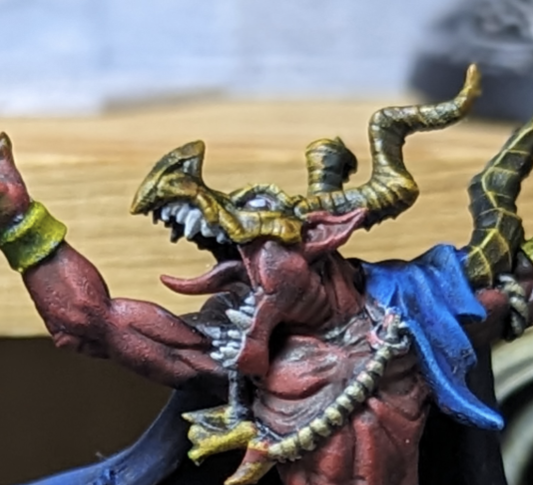Just finished all the armor and now on to cloth bits! I used greenish white, deep yellow and dark Prussian blue (ak) over a purple undercoat.
Wildberry poptart army
🤣 true
What’s the purpose of the purple tinted primer? By the final model in the middle it looks like not too much is actually purple. Just wondering what the use is. Genuinely curious.
Good question. Im using it as the deepest shadow color. On the finished one I covered up too much of the purple for my liking but some of it is still present.
The other models still have purple in the armor. I definitely got the feel for this paint scheme the more I did it.
But ya, most of it gets covered.
Oh, these are really exciting! Good work! I love the color combination
Gonna necro this post so I can ask about your priming color selection.
Those purple/ blues aren’t very apparent in the final model at first, but the colors you chose obviously do a lot of work in creating the look. How did you decide on that color scheme of priming?
I mentioned in another post some orc armies I wanted to paint, including a red-skinned “fire ork” army. I want to avoid just priming them in a color that makes up most of the model to get some more depth like I see in your final products. My first guess would be to shoot some dark purple/blue from below and use a yellow from above? Does that sound similar to how you would approach that color scheme, or am I way off base?
How do I decide the color scheme of priming? It’s a hard question to answer because many different approaches can work. I believe the technique is called underpainting, especially in the fine arts world. For example, many clasical painters will paint skin green first as an underpaint before making them more skin tones.
One heuristic you could use would be to think about the light color coming from the sky and reflecting from ground. For example, a warm sunny day over a forest floor would be yellowish from above and green from below.
But I think the two color priming can lead to interesting results regardless of what colors you choose. Though I might try to make the under color darker in value that the over color.
For fire skinned orcs, if you’re going for glowing from within I would base white followed by layers/drybrushing of yellow, orange, red, then brown.
If you want red skin I think your idea could be super interesting. Just make sure you mix some of those colors into your reds as you layer up, as well as letting some of those colors show through in the deepest shadows.
Keep on practicing and exploring. You’re asking great questions!
Thank you again for you advice and encouragement. I just finished my ice skinned orcs and they look… well, like my first attempt at making interesting skin tones. Haha. I think I’m using too much paint and covering up the base coats for my priming color to matter much. Their base coat was also completely blue-gray, which was the bulk of their skin tone, so it didn’t allow for much variety.
When I get around to painting the fire orcs, I’ll make sure to mix the base color with the skin colors first, then (dry brush?) the primary tones on top of that.
I do quite dislike drybrushing (the technique, not the results) as I feel it takes a lot more time, but I suppose it’s something I’ll get better with over time.
I’d probably just do thin layers since I’m not great at dry-brushing either. But either could work.


